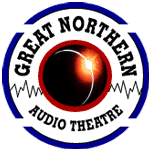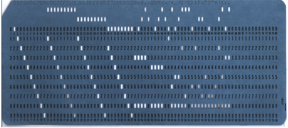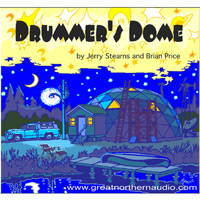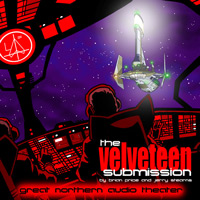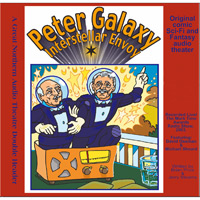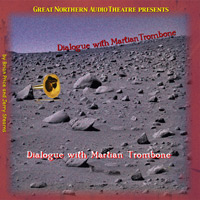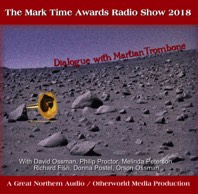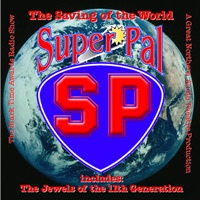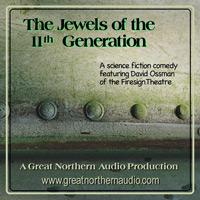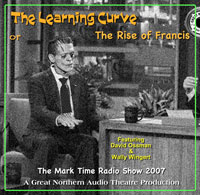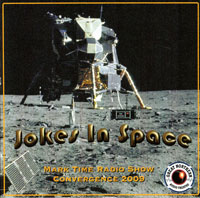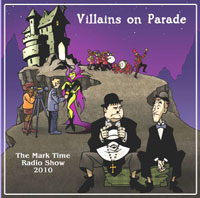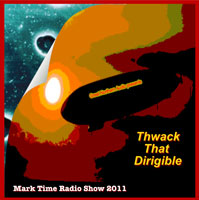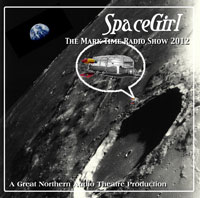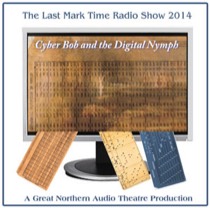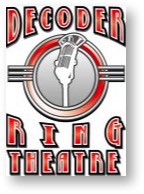The Partial Secret Untold History
and Production Notes of
The Mark Time Radio Show
As Produced by Great Northern Audio Theatre
By Brian Price
Introduction
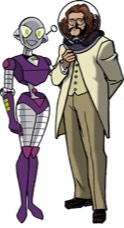
Last July Jerry Stearns and I wrote and produced the last Mark Time Radio Show (Cyber Bob and Digital Nymph starring David Ossman) at CONVergence 2014 in Bloomington, MN. We didn’t think much about it. We just did the show (a month or so of developing the script over Skype, casting the usual suspects, one-and-a-half rehearsals, a half cue-to-cue and then hitting the stage in front of 500-600 people). We didn’t discuss that we’d come down to having produced 19 years of science fiction satire shows together. But I was thinking—well, that’s a body of work. That’s a lot of stuff.
I don’t think either of us has listened back to the entire canon, one after another from beginning to end. I don’t think anybody has. I wondered if all those shows sounded any good? Did they make any sense? Did they march off into some greater cosmic scheme? Most importantly, did they make anybody laugh? They were supposed to make people laugh.
So, I’ve decided to try a little exercise and listen back to each Mark Time Radio Show (listening to one per day for the next 19 days) like I’ve never heard them before, and then comment on each one, say what I liked, what I would’ve done differently, what I remembered, soulfully thank every actor that ever lent their precious time and talent to the show and quote maybe some favorite lines.
I do remember, as the idea of being able to write an annual show dawned on us, that Jerry and I both wanted to tell our own stories and develop our own original characters, as opposed to producing straight up topical parodies of Star Wars or Star Trek (which are so much fun and probably would’ve been a lot more popular, accessible and easier to do). But we liked having our own characters. I like Cyber Bob and Master Pangborn, the Hungarian Dwarf Parade and Peter Galaxy. I like that they just flopped out of our addled brains.
Now, Jerry and I, we can pretty much talk seriously about audio drama, science fiction and fantasy, stagecraft or storytelling until we’re blue in the face, and probably have. But I think it is important to remember that we are satirists. We’re idiots. We’re absurdists. We think the world is a pretty silly place. So, here I quote the Great Northern Audio Theatre official motto:
“Ours is not to create the machines of future.
Ours is to make fun of them when they break down.”
That’s what we tried to do. On to the first show.
(See more about all of Great Northern's shows on our Productions page. Nearly all of these have been played on someone's podcast over the years, so check around. They're out there somewhere. Try Midnight Audio Theater, Episodes 152–155 or Moonlight Audio Theatre, and others. You can pick up compact discs or MP3s online at Blackstone Audio’s Downpour site in the Great Northern Audio Collection. Locally in the Twin Cities CDs (actual discs) are available at Uncle Hugo's Science Fiction Bookstore or Dreamhaven Books. - Jerry)
1. Coming Soon To A Galaxy Near You
April 5, 1996: Minicon 31
Mark Time and U.S. Mean Time by David Ossman
Vice Washburn “If You’ve Got the Time” by Jerry Stearns
Nomads from Neptune by Brian Price
November 18, 2014
I’d never been to a science fiction convention before. I don’t think David Ossman had either. Jerry had been to a million of them dating back to 1969 or something. Jerry can tell you. (My first convention was 1972. J.) I think he had a plan all along. He wanted his two favorite worlds of radio comedy, the very influential Firesign Theatre, and Minnesota science fiction writers and friends to collide. The two groups were fans of each other, they just didn’t know how to get together. So, in 1996 Minicon 31 invited David Ossman to Minneapolis as one of their Guests of Honor (GOHs). I snuck in the back door.
Minicon’s opening ceremonies always included a few skits and comedy routines full of jokes and puns starring fantasy writer, Kara Dalkey, fantasy high priestess, Jane Yolen, Brian Westley (who went on to design Firesign’s website), David Romm of KFAI-FM's Shockwave and others.
How to work Ossman into the mix? Well, Jerry made a very very ballsy move. He wrote a connecting skit and dialogue for David to perform as George Tirebiter called the “Life and Times (of George Tirebiter).” Nobody did that kind of thing. Nobody aped Firesign. Firesign rarely (never) shared their material or wrote with other people. Like Monty Python, the Firesign Theatre, as a group and individual artists had moved on. They didn’t want to do “Bozos” anymore. But with a very smart script Jerry made it work.
What we have with the “Life and Times (of George Tirebiter)” is a very rare production where a Firesign member rolled his material (David supplied two skits) and his performance into a collaborative show. It was slick with inside references and the idea of Tirebiter trying to buy back his more embarrassing 1950s B-movie productions from a TV host was very funny.
I took on the job of writing a few scenes for the fictitious B-movie “Nomads From Neptune,” where my favorite exchange was: “Hey Queen, are you really nubile?” “Nubile as the day is long.” So we had a parody of Firesign Theatre doing a parody of classic radio and we even worked a dinosaur named Carl into the script, and this is where it gets really cool--Ossman improvising as Tirebiter threw in the quip: “I didn’t write this, the dinosaur is not mine.” I’m so proud of that. I wrote a fictitious scene that a fictitious character denied writing. Can’t get any better than that?
And of course, the radio show was “in 3D where available.” A darn good show and clever homage to the Firesign Theatre. Never released for obvious reasons. (Galaxy Near You audio, short edited version, approx 20 minutes.)
2. Sci-Five Live
March 28, 1997: Minicon 32

November 19, 2014
I forgot to mention that somewhere along the line during Minicon 31 Jerry, David and Rich Fish came up with the idea for the Mark Time Awards, the world’s only award strictly for the best in science fiction audio theater. I don’t know where I was, probably stuck sitting at the kid’s table. Anyway, the reality of an annual audio theater award ceremony created the reality of an annual live stage show and maybe an annual appearance by Mark Time himself. We went for stories that year, short stories. We wanted to write pieces that hopefully people might want to hear more than once.
High Moon by Jerry Stearns
This tight little silly western became a signature piece for Jerry. There is really good writing, wonderful use of magic cowboy language, and very nice little philosophical tidbits, plus a great thunder-balloon sound effect. (Podcast as part of Three Wizard Tales by Moonlight Audio Theatre.)
“I’ve got to go and take a wiz first. I’m a wizard, you know,” the wizard said. What a great line. This bit has probably been performed by a dozen groups across the country.
Rocket Pierre and the Stainless Tin Rat by Meatball Fulton
Tom Lopez was the guest of honor that year and he brought along this silly environmental piece about an eco-tourist (Jerry doing his worst French Canadian accent) visiting a stinky little planet and running into an evil narrator. Good stuff for the live stage. (Stainless Tin Rat audio.)
The Collapse of the 20th Century Was So Gradual by Brian Price
David and I have always shared a love of the sound of words. I think deep down he always wanted to be a Beat poet and I always wanted to be a prose poet (open another window on your browser right now and look up Russell Edson), so I’d write these short pieces for David to read as segues between longer pieces. This one mentions climate change among other changes, and mentions my daughter who was about two years old at the time. “The water lapped Biblically at our feet.” That’s got a nice ring to it. David Emerson played the electric piano. (Collapse of the 20th Century audio.)
The Last Shuttle by Brian Price
Jane Yolen (I looked her up for you http://janeyolen.com/) was the perfect narrator for this little short story. I don’t know how frighteningly original it is—it’s hard to get original with science fiction sometimes, but it had a neat cast with Kara Dalkey and Kevin Swan, who’d just won a Mark Time Award, had come to collect it and got recruited into the show. “In these modern times most prayers are said in automobiles.” That’s got a nice ring to it, too. (The Last Shuttle audio.)
All these pieces had some soul. High Moon ended up on a CD with Dialogue With Martian Trombone. That’s a good CD. If I were you, I’d get one for your Grandmother for Christmas right now.
(I told Jane Yolen that she sounded like she knew what she was doing with a radio script. She said she'd grown up in a radio station where her dad worked. Well... okay then. Welcome to the Radio Extras Guild. -- Jerry)
3. Wizard Jack
by Brian Price
April 10, 1998: Minicon 33
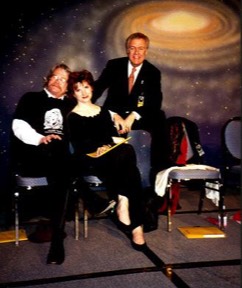
November 20, 2014
Jane Yolen has a wise voice. It has kindness and intelligence to it. Maybe because she’s a writer and a wonderful storyteller, but she just sounds like she’s been around the shire a few times. You want to hear what she has to say. So, I wanted to write something with her voice in mind.
And I’d always wanted to write a love story that wasn’t about kids, about young love. Wizard Jack ended up being about a couple of old magicians (David Ossman and Jane Yolen) who had spent a lifetime together.
(Photo at right: David Ossman, Melinda Peterson, Phil Proctor.)
We knew that Phil Proctor and Melinda Peterson were coming to that year’s Minicon as guests of honor, so we knew we were going to have an amazing cast, a completely professional cast. You don’t usually get that in Minnesota in the early spring. So, we let the play go a couple directions at once, because we could. This is the first piece where we combined heightened language, poetry, political satire and introduced squeaky toys into the fun and it all blended together.
Listening back I don’t know where all the language came from, but there are a number of lines that just sound good all by themselves:
“Do you know any spells for a broken cathedral?”
“I don’t want one tomorrow. I want all the tomorrows.”
And course,
“Oddly, enough puberty improved him.”
We had one-half of Firesign Theatre, a terrific voice actress (Melinda’s Bimi LaBam still cracks me up) and one of the world’s best fantasy writers in the cast. What could go wrong? Nothing did. Even technically I was able to push the “replay” button just at the right time to keep Mike Wheaton’s cool recorded piano part going under Jane’s final lines—and they both came down together. Now, that is magic.
We shared the stage with Shockwave that year, so this is the only Great Northern piece that we performed. It’s on the Blackstone Downpour site as one of 3 Wizard Tales. (Podcast as part of Three Wizard Tales by Moonlight Audio Theatre.)
Oh! The other thing that happened that year was I called up Phil in L.A. (long distance, on an old Bell phone, in the kitchen—surprised my mother wasn’t listening) a month early to run his lines and talk about the play for a few minutes. An hour and a half later Phil had run me through every line of the play digging and questioning, tightening and getting rid of doubt of what every word meant. It was exhilarating. I found out what the play was about. I’d written it and I didn’t know what it was about until then. I called Jerry up and I said we’re got to promise ourselves to talk through every line on anything we ever write from now on. We called the process, Proctorization. We use it to this day. Sometimes it hurts, but it always made things better.
(I had other duties that year, like performing sound effects for a revival of our 1976 Fannish Musical Midwest Side Story, so I got to watch from the audience this time. Above photo from Brian Westley. You can hear his part of that year's show at his website. -- Jerry.)
4. Duplicating Duluth
by Brian Price and Jerry Stearns
April 3, 1999: Minicon 34
November 21, 2014
“My love fry is always exposed and vulnerable.”
--Nina Fractal
No big audio names were invited to Minicon in 1999. Or, at least they didn’t show up. It was the end of the century and we were on our own. So, of course, Jerry and I decided to double down and write the most intricate, poetic, complicated, idea-saturated script we had ever heretofore attempted to put down behind a computer screen.
Jerry said one time about Terry Pratchett, “He has ten new ideas on every page.” We said, why not do that with our scripts? So, we dumped a huge pile of ideas into Duplicating Duluth. It became a template (maybe not the most successful template, but a template) for how we would write many of the Mark Time Radio Shows—add a little of this, add a little of that, stir and then add a bunch more.
We ended up with digital silliness and references like "www dot service dot service dot service dot com" (I had to type that with spaces so the bogus web address wouldn’t keep sending us all to the internet searching for the dumb bogus website!), genetically enhanced fashion body parts, moving Hollywood to Minnesota, and an infinite loop of lawyers.
The best thing we did that year was bring in one of our most favorite people in the whole world, Irene Ruderman (http://totallygrossnationalproduct.com/artists/stolyette). We’d met her when she was 19 and taking acting classes with Don Cosgrove and at the U of MN. I don’t know how to describe it. Irene has this broken sweetness to her voice and an ability to evoke three separate emotions in a single line, a single sentence. We’d cast her as Finch Shelmerdine, the lead in PERMAFROST, MN. I’d cast her in anything, and she sounded perfect in the opening and closing monologues of Duplicating Duluth backed with Darren Callahan’s Teenage Blackout CD (http://www.darrencallahan.com/). Irene and Darren are both those kind of friends who make me feel cooler than I am. I appreciate that about them.
Duplicating Duluth drew a lot of inspiration from our stumbling, drunken elephant of a project: Verifying Graffiti.
The live show kind of sagged under the pull of poetic language and an over-enthusiastic plot. Still I like it. The recording was passed around on cassette (yes, cassettes still roamed the Earth back then), but was never released. I’m thinking we’re going to have to put out a rarities compilation CD pretty soon.
Duplicating Duluth audio.
5a. The (first) Mark Time Radio Hour
Cyber Bob and the Silicon Kid
by Brian Price and Jerry Stearns
April 21, 2000: Minicon 35
November 22, 2014
“Yep, Kid. Seventh grade. Every geek's nightmare.” -- Cyber Bob
This is our first real classic Mark Time Radio Show. The show felt relaxed and in place. Jerry and I were writing completely and utterly as a team and we pulled together fun ideas, fun parody, and tight, well-developed characters, and hung it all on the old detective genre. Sometimes it’s good to plug into a known quantity (especially with the luxury of only two rehearsals)—everybody knew where to go.
Our regulars all ran with Cyber Bob. Rich Fish did what he does best—fill in for 3 or 4 voices. Brian Westley did a great turn as Spider Webhead. Jane Yolen was perfect as Sal, the supercomputer. I guarantee that you’ll never look at a computer punch card the same way ever again. And little four-foot-ten - under five foot anyway - Irene Ruderman got to play a 7-foot tall supermodel. Only in radio.
David Ossman had returned from a year off and brought along the entire von Ossman troupe—his sons Orson and Preston. So, we wrapped the Cyber Bob show around them and I have to say, Orson at 11-12 years old was game for anything. But, of course, it was left to David to hold it all together, counter punching and keeping the flow of the show even and just slightly absurd.
There are a few themes in this story that show up in a lot of our science fiction satires: The fear of getting left behind, passing the torch, and a quest. I’d look out in the audience and the year 2000 SF Convention crowd suddenly had kids and jobs and stuff to do, and, still, I bet you, even with all those responsibilities, everyone of them felt like 7th graders. I know I still do.
Despite this show having kids in it (school groups keep performing it, which is cool), it is a tough script to direct. It’s got a lot of nuance and it took a lot of talent especially for Orson and Irene to maintain a necessary and easy sense of innocence.
This was one of those times when we captured something that wasn’t always going to be, something ephemeral. The Ossman kids have since grown up. How’d that happen? Orson is a film maker in L.A. and Preston is in a rock and roll band somewhere outside Bard College (home of Steely Dan). And who knows, they may end up stars, but I’ll always hear Preston saying to his older brother in a squeaky 7-year-olds voice with a born actor’s total conviction, “You’re history, Kid. Here’s your check.” Glad we had the tape recorder running.
(I remember in this script we began to figure out how to make up bogus tech talk that was funny, yet made even someone with geek tendencies stop a moment to think about if that really meant anything. Then laugh when they realized it was nonsense. We spent time pouring over computer dictionaries and wikipedia doing research but looking only for what it sounded like, not what it was used for. (See the Great Northern slogan, above.) -- Jerry.)
5b. Drummer’s Dome
by Brian Price and Jerry Stearns
April 21, 2000: Minicon 35
November 23, 2014
“You’re as old as the Beatles?”
“Older.”
Jerry had this idea about an old guy building a geodesic dome and somehow capturing “somebody else’s” gravity inside and we made it into a love story. It’s a nice little piece of science fiction.
We were too busy and crazy and went overboard with Minicon 35 and tried to produce two complete live plays in 2000. Drummer’s Dome had a lot of complicated sounds effects, plus drumming, and we just didn’t have a way to do the sounds of floating and the loss of gravity or the collapse of a building live. (We did have a live drummer, Jeff Schalles, who never missed a beat - J.)
So, there are two very different versions of Drummer’s Dome: The live version with a fine performance by David Ossman, Irene Ruderman, Jane Yolen and Jerry Stearns (which was never released. I’m not sure it was ever broadcast.)
The other is a recorded version with Dean Johnson, K.C. Braun, Beryl Greenberg and Irene. In both performances Irene’s voice makes you want to fall in love. The big difference is that we added a less-Twilight Zoney extra ending and created a nice, SFX rich stereo mix for the version that was released (with nice cover art by Ken Fletcher). The second version included real drumming by a real drummer, Bill E. Webb and a bunch of added web materials about Drummer’s band, Bent Sunshine and their 1969 double album release, “Excess Is Not Enough” on Northern Rails Records. Jerry even printed t-shirts. Look it up on the website. I love all the fictitious song titles we came up with.
This is probably a good place to mention how we dealt with sound effects in our writing and in our live productions. A huge difference between stage theater and audio theater is that in audio you can (and I think should) keep a piece moving by changing background ambiences and creating interesting and recognizable audio changes from scene to scene. We were usually thinking about “what does this place sound like” in early drafts (you can get yourself in lots of trouble if you don’t) and had something in mind like birds and forest sounds for Drummer’s woods or a bunch of computer beeps and whistles for Sal’s computer in Cyber Bob. We usually live mixed those backgrounds in on the shows. Where I admit we did a little fiddling is with big crunching sounds of like Drummer’s Dome falling down or the system crash in Cyber Bob. It’s just really hard to get multi-layered sounds right live. I remember putting Cyber Bob on multi track to build a whole new crashing sound that had a progression and get the timing right. Cheats that we are—we just sweetened the mix a little bit.
6. The Velveteen Submission
(or The Lighthouse at the End of the Tunnel)
by Jerry Stearns and Brian Price
July 6, 2001: CONVergence 2001
November 24, 2014
“The first law of enlightenment is payment.” -- Master Pangborn
A good year.
We came up with a new character for David Ossman that year. The space-age snake-oil salesman and two-bit con-man, Master Pangborn. The name Pangborn comes from one of our favorite old-school science fiction authors, Edgar Pangborn (Look him up. Read DAVY. I’ve got three copies. I’ll lend you one, but you’ve got to give it back, so I can lend it out again.) Pangborn ends up boarding the last lighthouse at the end of the galaxy being pursued by his doe-eyed novice, Ripley, played by the doe-voiced Irene Ruderman.
Every character in this play is a happy idiot. It’s great. They don’t have to tell jokes, they just have to tell it like they see it, which is through rose-colored goofy glasses. Our two guests Stuart Matthews (a founding member of the legendary Little City In Space—one of the great community radio secrets of the Twins Cities) as Walter, and Roger Gregg (founder of Ireland’s Crazy Dog Audio Theatre) as Capt. Horatio Jacob Squid were particularly good at portraying “clueless.”
The script employed easy to plug in, immediately recognizable silly cartoon sound effects and plowed through pirate parody and romance novel jokes stopping to make fun of engineering language like, “Realign the repulsion beam,” and to ask the question, “Why do people always take showers when they are in a horror movie?”
However, what really made this story move was stealing one of the oldest adventure story conceits of all time, often used by Star Trek--the Tick Tock Plot. You know the drill—put a countdown to disaster in the story and you’ve got immediate tension. We, of course, were making fun of the Tick Tock Plot with Rich Fish butting in all the time saying, “Warning, warning, 12 minutes, 8 minutes, 2 minutes until disaster,” but that didn’t matter. What’s amazing about the Tick Tock Plot is that it doesn’t matter if you’re joking around; it still works. Maybe our poetry and song lyrics would be better if I used the Tick Tock Plot.
(The final title, The Velveteen Submission, comes from Pangborn's for-sale spiritual movement - sounds like a slightly kinky children's book. The original title, The Lighthouse At the End of the Tunnel, is the ticking part of the plot. Cover art by Christopher Jones. --Jerry)
The other thing that made this year special was bringing in a real live, working, musician—our old friend, Mike Wheaton. Having music that immediately reacts to and rolls with the actors and action makes all the difference. So, we put Mike and his music in everything.
The Clones’ Day Parade by Brian Price
“Evolution pulled up beside me…” Another live prose poem with live music. David absolutely nailed this sucker. Getting every nuance. Bending every word, with my old friend Mike killing it on the electric piano. It’s cool. It’s intelligent. It’s mildly philosophical. “…don’t bother reading what’s on the monuments.” Who the hell wrote this thing? I’m really proud of it.
Republican Girl by Mike Wheaton and Brian Price
This is the only known live recording of a novelty song Mike and I wrote and have dragged out for every election season. About a Democrat falling in love with a Republican Girl: Here’s the last verse:
I try to be good and keep my ACLU card under a lid
I'm kind to the servants and I keep the good liquor hid
But now that my baby is in a family value kind of way
I'll be damned if I raise a republican kid
Never had to change the lyrics since 1988, which is kind of frightening.
The Mark Time Awards presentations switched from Minicon to CONVergence in 2001. Minicon was sticking to print (books) science fiction and CONVergence was more open to all media. We had no choice, but to go. Jerry can tell you more about it.
7. The Desnoyer Fault
by Brian Price and Jerry Stearns
July 5, 2002: Convergence 2002
The Stumble before the classics:
“Don’t subscribe to cable, make cable to subscribe to you”
There were some moments in this show, but not enough of them. Not enough good original material. Good material doesn’t grow on trees. It doesn’t even grow enough in your mind half the time. We only had a half hour for this show for some reason. We were out of resources. No live music. A skeleton (but happy) cast. We were Dave-less once again. We’d figure out how to have a good show without David Ossman, but not this year. Here’s what we did:
Wall of Science (from I Think We’re All Bozos On This Bus)
Jerry got permission from the Firesign guys to perform this seminal piece of wonderful satirical imagines and great twisting language. Rich Fish and Jerry had waited all their lives to get to perform this bit on stage. It ended up sounding almost too reverential. We did, however, hear the amazing Windy Merrill (Bowlsby) in our cast for the first time.
Your Mileage May Vary
By Brian Price. Rich Fish did a nice reading of my prose poem about growing up on the largest pile of tires known to man. Had a nice surreal quality to it. Worked well. Unfortunately, we lifted a track from the great Jimmy Smith and his Hammond B3 organ for background music. The music worked just right, but we didn’t have the rights, so it can’t be played again. I should just get Rich to perform the poem again one of these days.
The Desnoyer Fault
Jerry and I were once again drawing from the giant pile of ideas that we called Verifying Graffiti and once again the ideas and images (like a skuzzy cable being attached to an easy bake oven—that got a laugh) outweighed the character and heart of the piece. Don Cosgrove and Irene Ruderman did their best to try to get this stuff off the ground, but it was just kind of too stuffy and not totally baked. It was good practice ("a good outing for the troops" - Howard Koch, via Jerry) and a lesson about when ideas aren’t always stories. The core idea of St. Paul and Minneapolis being along a rift in time (The Desnoyer Fault, which is actually a street on the line between the cities) has something to it. I just don’t know what.
(It's Emerald Street on the East side of the Mississippi River that is the border between the Twin Cities. We had this idea that there was also a time fault there, so that, for example, if you crossed the line while listening to the radio you'd either miss a minute or add a minute to what you heard. It might have been a terrific audio effect, but never was written in to this part of the story. Desnoyer is the avenue on the other side of the railroad tracks from Emerald. -- Jerry)
I sometimes want all the characters and all the ideas in a show to be new new new—never seen or heard from before--and sometimes that just doesn’t go anywhere. It got me to thinking about archetypes. The next year we’d play off of a number of different archetypes and hit a couple home runs. Yea for the ancient Greeks.
Production-wise, we knew we needed help, and the next year we’d fix that, too. We would bring in a producer.
8. Peter Galaxy: Interstellar Envoy
by Brian Price and Jerry Stearns
July 4, 2003: Convergence 2003
November 26, 2014
“I feel like I’m sitting in pudding.”
“Really? What flavor?”
--- My favorite exchange in Peter Galaxy
It was time to make fun of good old fashioned, golden-age radio serials, because it is where so much of the fandom of radio theater remains, whether they are listeners or producers—golden age radio is what a lot of people feel like audio theater sounds like and should continue to sound like. I don’t agree. I think audio theater, the dialogue especially, should sound like what’s going on now. It should sound like what we are—not what we’ve been. But it’s ok to make fun of it.
So, following our themes of getting left behind, passing the torch and a quest we made fun of old-time radio, show biz, and, of all things, immigration. First, we had to start out by creating a fictitious, but real sounding 1940s radio show - Peter Galaxy, Interstellar Envoy. When we get into this kind of thinking Jerry, who has listened to everything, naturally insists on tons of fun back-story and writing an entire episode of Peter Galaxy. So, the beginning and end of the show has a very solid feel, because we knew what it was supposed to sound like.
It helped to have not one but two old “pros” in the show: David Ossman who had already created his own alternate reality about a former radio star (George Tirebiter) and I think sometimes wishes he’d been born 25 years earlier so he could’ve actually been a 1940s radio star; and Convergence Guest of Honor, Michael Sheard, who had the pedigree of having played in Doctor Who, and Star Wars as Admiral Ozzel (the guy who “failed” Darth Vader “for the last time”). David and Michael had no problem at all jumping back and forth between playing actors and acting like they were playing.
Sheard was a Shakespearian trained actor, who’d gone over to film and television. He hadn’t performed on stage live for a long time and I think he was a little hesitant, but we talked him into it. We even talked him into rehearsing. He took to the live microphone like a duck takes to water—he milked every laugh. It was great.
In 2003 we weren’t going to ever again be unprepared or under-resourced. We got Kris Markman to show up to help produce and record the show—competence is such a wondrous attribute. We bought in a couple new sound gadgets like a sampler that we used in NAPA. Brian Westley was doing great on live sound effects. And Rich Fish and our young veterans, Irene Ruderman and Preston Ossman were back with us. But the real revelation (and maybe a final piece in our talent puzzle) was having Tim Wick and Windy Bowlsby join the cast. They were so dead-on funny as the alien Zabarians, I laugh every time I hear them. Tim and Windy are super science-fiction and fantasy fans, trained actors and musicians and have always headed right for the funniest parts of whatever script we put in front of them. They made great foils for Michael and David.
Tell Them NAPA Sent You
or
There Are Two Ways To Do This
Yes, some of the best comedy comes from reality and, for me, comes from absolute screaming frustrating with every insult the real world heaps up. Here the quest was for some damn part for my damn 1985 damn Volvo station wagon. We got sent all over Brookings, SD looking for the damn thing, which may as well been a Pre-emissions master flow valve sensor unit. (I remember one of us answering the question of "What's the story here?" with "My God, It's about what we just lived through!" -- J.) By the time the script was done, it was the Odyssey all over again. It was the magic of playing off archetypes. This is one of those pieces that reads like it just fell together, but I remember one very important change we did was to put the siren and the street urchin in the same scene, which leads to my favorite part where Irene and Preston (“Hey Boody, Boody.”) led David past the merchants of rare filth to the halls of infinite entryways. It took Homer who knows how many free-verse couplets to get home. It just took us 15 minutes.
(Podcast as part of Three Wizard Tales by Moonlight Audio Theatre.)
(For those of us who too often get paid in advertising t-shirts I was gratified when the wizard at the end of NAPA uses his specialized knowledge and expertise and is satisfied to get only a plastic pocket protector in return. Humor out of reality. -- Jerry.)
One slightly sad note is that this was Irene’s last show with us. She went on to law school for a little bit and business school, a happy marriage, a devastatingly cute kid and a sideline as a singer in a electric Russian folk band with her bass-player husband. Cool. Check on Stolyette next time you’re in Minneapolis.
Finally, Michael Sheard pulled me aside after the show and told me that he hadn’t had so much fun in 20 years. I felt 10 feet tall. He gave us such a wonderful performance it felt good to feel like we’d given him something in return.
Superb Cover art by Ken Fletcher.
9. Dialogue With Martian Trombone
by Jerry Stearns and Brian Price
July 2, 2004: Convergence 2004
November 27, 2014
“John Houseman can eat my shorts.” -- Dickey Dyson
What happened to the Ramon Raquello Orchestra after the infamous October 30, 1938 national radio broadcast of War of the Worlds? That’s the question we asked. That’s what we wanted to know. That’s the diving board from which we dove.
(This is one of those ideas I carried around in my head for 20 years or so. You know how you refine it, and tweak it, and always think it's wonderful? It took my teaming up with Brian to get it down, and it still came out differently than I had expected. It's much better and more complete. David Ossman unwittingly suggested the title when we told him what it was about. -- Jerry.)
One has no idea when you wander into the world of War of the Worlds, even to do a simple silly satire (well actually Trombone got pretty detailed and complicated), just how big and all encompassing that world is. War of the Worlds is a cavern of mirrors—it just reflects itself and just gets bigger and bigger. I know of no other mass medium where there is ONE show and ONE show only that everybody knows. When you mention television, people will bring up different favorite programs. When you say film, people have their opinions. But when you say old time radio—the War of the Worlds, and only the War of the Worlds comes up. It’s where the listener’s knowledge of radio starts and, unfortunately, often stops.
Making fun of War of the Worlds is like giggling in church--radio theater church. It’s fun. It’s a little dangerous. And you’d better know the litany. Fortunately for us we had Jerry who has studied and lectured on the show and its times, and David Ossman who directed the 50th Anniversary version of the show and possesses an original script to boot. Most importantly we came up with a nice premise where we simply said Orson Welles was wrong and went from there.
And we had music. Once we had the idea of the Ramon Raquello Orchestra being wronged by Orson Welles and the Martians, who naturally hated all music, we were off and running. We got so into it we hired a real trombone player – Jim ten Bensel.
We had to take on some problems that had always bugged us. One was the horrible acoustics of the hotel grand ballroom. There is no worse place on earth to present live theater than a hotel ballroom—the microphones ring, the sound bounces off the walls, the chairs squeeze. We decided to join ‘em rather than beat ‘em. The first scene of the play takes place at the 14th occasional reunion of the Ramon Raquello Orchestra in a crappy hotel ballroom hosted by a drunken host. David had a great time playing blotto and kept it real by pointing into the audience telling them to shut up and stop looking at him. I had to look it up, but one of the people David was picking on in the audience was Hugo Award winner, Larry Niven. Niven was rolling on the floor laughing.
Another challenge we swatted at pretty successfully, I think, was how to get across a number of threads of back-story without sounding dull and brain dead. We used flashbacks, power-point presentations (starring Phil Proctor), asides and broke the 4th wall. Everything we could think of.
Besides the usual great acting by Tim, Windy and Don Cosgrove, Jeff Adams (Icebox Radio Theater) joined the cast. He had come down from International Falls to pick up a Mark Time Award and ended playing a CIA agent. Our motto, get an award, get a part in the play.
(Finally being able to put on this play and be happy with how it came out has doused any latent desire I might ever have had to do anything more with The War of the Worlds story. I've been there and done that. I have no need to watch some local community theater recreate the Howard Koch script around Halloween- and it happens every year - much less participate in doing it. So it will probably be a while before I seek entertainment in any of the two dozen different versions, parodies and take-offs of the story that I have - and I don't have them all, either. Find out about these at our Wars of the Worlds page. -- Jerry.)
(Having said that, at the HEAR Now Festival in 2018 we got together an all-star cast and crew in a revival of this play, and the result is rather raucous. You can listen to Martian Trombone 2018 here.)
(And then we went ahead and performed it again at the HEAR Now Festival in Kansas City as part of the Mark Time Awards presentation in 2018. We had an allstar cast and crew, and we couldn’t pass up the opportunity to do it for “radio people”. It was out of control from the start, but so much fun. —Jerry, Aug 2018)
Here’s some important information. Five sure signs that you know you’ve seen a Martian:
Once you’ve hired a Trombone player—in for a play, in for a poem. David nailed down another one of my prose poem pieces using the voice of a carnival barker. Jim ten Bensel was there every step of the way filling in and accentuating. Two hams performing at the same time in the same place. They even marched off the stage together.
Tidbits:
Here’s some important information. Five sure signs that you know you’ve seen a Martian:
- Well-tailored suit
- Gills behind the ears
- Can’t bend their little fingers
- Vertical pupils
- And most importantly, just the subtle hint of Old Spice aftershave.
A Cure for Science
Once you’ve hired a Trombone player—in for a play, in for a poem. David nailed down another one of my prose poem pieces using the voice of a carnival barker. Jim ten Bensel was there every step of the way filling in and accentuating. Two hams performing at the same time in the same place. They even marched off the stage together.
Tidbits:
- War of the Worlds is part of the DNA of anybody who works in audio theatre. It just is.
- Our old friend, Tom Lopez of ZBS, really liked this show and used to carry a number of our cool CDs in his catalogue. This raised our sales from the single digits to the double digits.
- We had a good time coming up with the CD jewel case cover of the Trombone buried in the Martian sand.
- Finally, when in doubt, hire a trombone player.
10. Super Pal
or
The Saving of the World
by Brian Price and Jerry Stearns
July 1, 2005: Convergence 2005
November 28, 2014
“Is the comet naked? And if the comet is naked can we characterize this nude comet as a moral threat as well as a disastrous threat to the heartland of the homeland of America?” -- Katie Rumba
We finally figured out how to produce a tight show without a professional actor guest star. Don’t give the main character any lines. SuperPal never utters a word in this mockumentary skewering all things comic-book heroish.
Rhythm. It was all about rhythms and patterns. News reporter rhythms, press conference rhythms, talk show rhythms, the foremost authority rhythms, the guy on the street, the witness, the kid with the cat, the confessional girlfriend rhythms. Contemporary media and its pace and flow becomes the message, because we listeners and viewers are trained to understand what is going on just by knowing the sound. The heck with context, we know what is supposed to be going on just by hearing what it sounds like. You could read the Yellow Pages and as long as you read it in the voice of a news reporter, it doesn’t matter what the words are—it’s news. Nobody knows this better than actors like Tim Wick and Windy Bowlsby. They just plug into the feel of a reporter or a press agent. It’s in their mocking DNA.
Actors like are old friends Charlie Meitzner, Sarah Eschweiler (both going all the way back to TUMBLEWEED ROUNDUP) and Don Cosgrove play off characters and accents more, but their scientist and mayor cracked me up, because they played the patterns so straight. Sarah as SuperPal’s on and off again girlfriend, Charise Bent, was dead serious the whole time. The more serious, the funnier and stranger it got.
What’s weirdest about the vocal rhythms of media, news and talk shows is that the interviewees know the rhythms as well. That’s what the rest of the cast plugged into—we’ve watched so much news and seen so many interviews, we know how we’re supposed to sound when making on-the-street comments.
The other conceit that kept the show moving was plugging into the disaster movie Tick Tock Clock Plot (8 hours to impact from the homosexual comet, 4 hours, 15 minutes, etc.) and keeping the scenes constantly changing every 45-60 seconds. It was about the news and innuendo, which are pretty much the same thing.
A note about the title: SuperPal Or The Saving of the World. I love double titles. Great Northern uses them a lot. It comes from watching too many Rocky and Bullwinkle cartoons as a kid. I remember loving the double titles at the ends of episodes, but also being a little disappointed. The announcer would always go “Don’t miss our next episode “The Boundary Bounders Or Some Like It Shot.” And I always wondered – well, which one was it? I still wonder.
11. The Jewels of the 11th Generation
by Brian Price and Jerry Stearns
July 7, 2006: Convergence 2006
November 29, 2014
“All we know is role playing and trivia.”
“That’s ok, most people get along fine with just that.”
This was a nice little show. It was a family show. It was about family, sort of, and it had family in it. David Ossman and his youngest son, 13-year-old Preston, returned to the main stage. And my 11-year-old daughter, Eleanor Price, made her first foray into the world of science fiction/fantasy conventions. They both loved it. And CONVergence loved kids. The geeks had finally grown up in the last number of years, paired off and had children, sweet little children. What do you do with them all? Well, in the first decade of the new millennium you dressed ‘em up as Tribbles or Harrys or Hermiones, checked into the hotel and (as Jerry always likes to say) went off-planet for the weekend. It was safe and warm and was a lot more creative and cost a lot less than Disney World
“Jewels” had a pretty simple premise—a treasure hunt—there’s the ever-present archetypical quest premise again. But we did an interesting thing. We made each character into a pair. David returned as the galactic huckster, Master Pangborn, and was paired off with the counter-punching comic talents of Charlie Mietzner as Larry Oddwalker. They open the action and discover the pair of jewels—Eleanor and Preston. Then a pair of pirates, Tim Wick and Windy Bowlsby, show up to take hostages, throw a wrench in the works and demand that the story shuffle the characters into new arrangements—which ended up being two triplets.
The idea of generational ships harkens back to one of my favorite movies, Silent Running starring Bruce Dern, that my best friend, Deany Fulton and I saw as kids at the Dominion Theater in Arlington, VA in 1972. It was a lazy August matinee and we were the only ones in the theater. They tore the place down the next year—what a shame. Anyway, once Jerry and I had the idea of thirty-two 300-year-old Generational vessels carrying Intellectual Property to the stars, we of course, had to try to name them all (the Einstein and the Presley, etc) and decide what was on them. Our characters end up on the ship carrying 1200 comedians, 800 motivational speakers and 6 mimes along with trivia and jokes—the Professor Irwin Corey. Irwin Corey who billed himself as the “World’s Foremost Authority,” but passed away in early 2017 at a mere 102. God bless him. (I love that the play is loaded with more-or-less obscure references to science fiction, fantasy and popular culture. They're funny, but it's not necessary to get the reference to get the story. And one day you'll listen to it again and suddenly go "Oh, that's where that came from!" -- Jerry )
The other theme in the play was information degradation, which I’m fascinated by. It’s sort of like being an archaeologist trying to interpret a story that loses bits of information over the years. That’s what I think computers do half the time—I think the information changes over time. (Hence the names of the kid characters, Harvey Pooter, and Princess Lonnie Anderson from the planet Alderan. -- Jerry) Of course, we had a solution—perform a séance, which Tim’s character suggests was “the way old time engineers used to talk to Windows 98.” That joke got one of our all time biggest laughs. Want a laugh at a sci-fi convention; just make fun of computer operating systems.
Unrelated Cliffhanger Theater
All we did was tack a bunch of “unrelated” thriller and adventure lines together. Everybody in the cast immediately jumped on and ran with every line. The audience loved it. Plot? Who needs a plot? (The plot was implied. --J )
Cart 437 (or the Long Way Around)
David and I got back to another prose poem and this one really resonated. I think because it has so much truth and, for me, personal myth in it. It’s about a shopping cart wrangler at Wal-Mart, who doesn’t start his career until he’s 75 years old. It’s the biggest fear of my life, to end up pushing carts after a lifetime of rejection slips and bombed play productions. David played this piece for real, which made it almost haunting. If you’re going to be a cart wrangler, then you’re going be the best one out there. The audience appreciated the piece, I sold it to a small press magazine for $25, and David still performs it now and then as part of his solo shows.
(And eventually Brian added two more Acts and it became The Old Cart Wrangler’s Saga, performed by David Ossman live at the Brick in Kansas City in June of 2018. Available now from Blackstone Audio.)
12. The Learning Curve
by Brian Price and Jerry Stearns
July 6, 2007: Convergence 2007
November 30, 2014
“Sweetheart, you can’t answer the door until somebody knocks.”
-- Barnum T. Hack, director
“Sure I can. I’m trained in improv.”
-- Holiday Vinaigrette, diva
This was a high-water-mark year for us where all kinds of talent and themes criss-crossed with each other and we just calmly bashed into one and went onto the next. Everything worked. You don’t get that too often.
The themes were very elastic: Economic development, Frankenstein (oh those archetypes) and Hollywood, which, in a way, are all kind of the same thing. All three are forces of nature, and no matter what you do, they keep coming at you. You can’t stop them. You especially can’t stop economic development. They won’t let you. I went to a town meeting in Brookings, SD that year and the topic was economic development. I brought up something like bike trails and one of the people on the panel said, the economy didn’t like bike trails, so they couldn’t do it. Apparently, the economy is a vengeful God. This is called economic fetishism. I digress.
The talent was elastic. Almost everybody in the cast played more than one character. David Ossman playing the brothers, Senator Mulder Hack and his Hollywood twin, Barnum T. Hack (you could tell David knew this kind of Hollywood hack all too well). Windy Bowlsby performed one of the best bad-acting jobs I’ve ever heard and also reprised her ditzy newscaster, Katie Rumba, from SuperPal. Tim Wick and Jeff Adams filled in with a number of foolish characters, with Jeff doing a fine turn as the drunk blind man in the proverbial woods. Then there was the amazing CONVergence guest of honor, multi-voiced, actual, in real life, with his own IMDb page, Wally Wingert (http://www.imdb.com/name/nm0935042/). He and David had never worked together, but they had a great time and were constantly ad-libbing, which made for a very elastic script.
The kids wanted to stretch, too. The year before I could tell that our rather precocious child actors, Preston Ossman and Eleanor Price, really didn’t want to play cute kids anymore. Can’t blame them. So, we made Preston a guru. And Eleanor was the computer voice. Eleanor had a lot of practice being an annoying computer voice by talking like that while she and I played ping pong in the basement. A lot of the dialogue for The Learning Curve computer came from Eleanor rifting off being dragged through middle school self-esteem building exercises. Whenever I’d miss a shot she’d say, “Good job. Good effort. You’re building confidence and respect for others.” It would make me want to hit the ping-pong ball that much harder and she’d laughingly win every time. For this we gave her a writing credit and made her write and perform the original music for the show.
I like the way the play starts in one direction and just drives on in a couple others, doing fast jump cuts. We learned a lot about what can be done on a live stage with this show. Mainly, learning that real good talent makes everything else in theater so much easier.
As Barnum Hack said to Big Jack Tarmac, “Keep the squid.”
The Tiniest Souls
For our prose poem piece that year, I ended up writing a kind of gray anti-fairy tale. I didn’t think it was that dark. I thought it was funny when I wrote it, but with David reading it became pretty and sad and longing. I like the images of being descendants of alchemists and the “little” people rewriting a child’s homework when he’s not looking. Mort Castle (http://en.wikipedia.org/wiki/Mort_Castle) bought it for Doorways Magazine. That was cool.
You Can’t Handle the Truth
Like “Unrelated Cliffhanger Theater” of the year before, we randomly tossed buzz words together in an oddly surreal arrangement and were blessed with Eleanor being extremely cute and Wally doing his absolute best Jack Nicholson.
A fun year. Learning Curve is available on a rare Great Northern Audio Double Header CD with Cyber Bob and Silicon Kid. You can get an actual CD disc at Uncle Hugo's SF Bookstore in Minneapolis (though it doesn't have this cover on it.)
13. Magic Notes
by Jerry Stearns and Brian Price
July 3, 2008: Convergence 2008
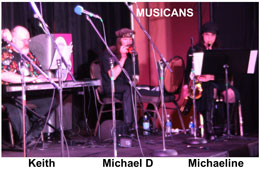
December 1, 2014
“How do we clean it up?”
“Me? I’d use a damp rag myself.”
This was a little year. Not a bad year. Just a little one. What happened? Why didn’t I write much for the show? Oh yeah, that’s right we were in the midst of moving 900 miles from South Dakota to Indiana. That’ll kick the creativity right out of you.
Luckily Jerry had Magic Notes that he’d been working on—a gentle children’s story about magic acting like jazz. We brought in a saxophone--Michaeline Sheehy, a pianist—Keith Spears and the late, very pirate-like Michael Deutsch on harmonica and they created a nice feel for the piece. Gotta love live music. We should’ve used them more. The play is a very Jerry piece chasing the themes of technology vs. magic and the paranormal vs. knowledge. Michael Fischbein and Megan Petersen (who, I kid you not, was probably born and was definitely raised at science fiction conventions) joined the cast. Wally Wingert jumped in at the last minute and played Dennis, the ghost of dead languages and mainly cracked the rest of the cast up.
I think probably the main tripping point of the play was it came across very sweet and sincere (we used the name Prince Casper, the Friendly Ghost of Narnia for gosh sakes). As we all know sweetness and sincerity are the enemies of satire, and at some point we should rewrite this piece, which was more complicated and more saturated with ideas (as usual) than we thought. It’s needs a better set up for the mystery and maybe a Tick Tock plot tacked on. We’re better writers now than then. We just need to get on Skype and do it.
Under the Broken Tree Bridge
This was a prose poem for Eleanor to read about a few kids that think they’ve found a missing evolutionary link in the creek at the edge of the park under a highway overpass. This actually happened to me. I wasn’t the brightest kid in the world and the squirrel was beyond being really really dead. I put two and two together and get seven. Anyway…this should be heard again. We should put it in some compilation package with David’s prose poem performances. Keith Spears added some nice piano (showing how fast and smooth a good musician can work) and Eleanor did a fine job finding that feeling when a kid thinks they’ve seen something nobody else has ever seen before.
Broken Tree Brtidge audio.
The Last Shuttle
Since this piece (originally produced in 1997 at Minicon) had never been released we did it again with real kids playing the kids and Windy doing a very silly job as the owner of the Tubs of Suds Launderette. We also added a harmonica. Last Shuttle audio.
This show remains unreleased. The moral? Use more harmonica. You can never have enough harmonica.
14. Jokes In Space
by Brian Price, Jerry Stearns, and Eleanor Price
July 2, 2009: Convergence 2009
December 2, 2014
“Why’d the Orc fall off the tower of Isengard?”
“I don’t know. Why?”
“He was dead. Why’d the second Orc fall off the tower of Isengard?”
“I don’t know. Why?”
“He was stapled to the first Orc. Why did the third Orc fall off the tower of Isengard?”
“I don’t know. Why?”
“Peer pressure.”
This was a goofy year. The Con’s theme that year was humor in science fiction. We kind of thought we’d been at least trying to do that for 14 years. So, rather than get all plotty and complicated about it, we trotted out our worst jokes, Star Trek parodies, puns, Monty Python take offs, dancing coconut hoof beats, reality television slams, Nigerian email scams and made fun of something very near and dear to a convention goers heart – panel discussions.
One thing I noticed by this time in the 21st century (2009) was there was a changing of the parody guard from science fiction to fantasy. The biggest stuff out there that year wasn’t Star Wars. It was Lord of the Rings. Hence, the Orcs. Orcs are funnier than Elves. Shoot, Orcs are a lot funnier than Ewoks. (But we weren't going to leave science fiction out entirely, hence the title: Jokes In Space. --Jerry )
The cast had a good time. They all got to play at least four or five different parts apiece, and play the parts they’d always wanted to play: Tim got to be Elvis, Eleanor got to play Wesley Crusher, and of course, Windy got to play a drunk Martian.
The pace was all about live jump cuts from one scene to the next, and the style was pretty gentle. That’s us. That’s our style. Instead of cutting insults, we tend to like, well, over-like things. Like the Nigerian email scam—everybody hates those things, but instead of saying, “Don’t they suck,” which is pretty obvious, we had everybody get a million dollars. Charlie and Michael did great with that.
We were working well-trod, well-fertilized territory, but that’s ok. Familiarity breeds laughs. (Brian also took so many jokes from his daughter, Eleanor, we had to give her a writing credit. - J )
Meanwhile the year’s Ogle Award winner, Fred Greenhalgh (FinalRune Productions), helped us fix a problem with the recording software by downloading a new version 5 minutes before the show began. The moral: Win an Ogle; get to sit at the engineer’s table with Kris and Jerry.
The show has a cool CD cover and it includes the Broken Tree Bridge and Last Shuttle pieces from the 2008 show.
15. Villains On Parade
by Brian Price and Jerry Stearns
July 1, 2010: Convergence 2010
December 3, 2014
“You walk down the throw-pillow aisle and you say, man I wish I owned all those throw pillows. And then you walk down the entertainment aisle and you say, man I wish I owned all those TVs.”
“Yeah, yeah, I’m with you, bud. Then you walk down the cat food aisle and you say, man I wish I owned all that cat food.”
-- Two Orcs during the Domination of the World
Ever been around to help somebody pull off something they had always wanted to do, but figured they’d never get to do? That’s what happened in 2010. Wally Wingert was returning to the Con and was up for performing with the Mark Time crew again. That was great in and of itself, but he also said he had talked a very special friend into coming out with him.
Chuck McCann.
Most people know Chuck (http://www.chuckmccann.net/) from a multitude of cartoons and from one of the most famous commercials ever—he was the “I’m coo coo for cocoa puffs” guy. But where I knew him from in my lost childhood was an old Dick Van Dyke Show episode, where Van Dyke did a dead-on impression of Stan Laurel of Laurel and Hardy (http://www.laurel-and-hardy.com/) and the other guy playing a dead-on Oliver Hardy was Chuck McCann. It turns out Chuck had corresponded and later met the real Stan Laurel as a kid and Laurel was a big influence on Chuck going into show biz, where one of his first gigs was reenacting Laurel and Hardy.
A voice actor like Wally Wingert had always been a big fan of a voice actor like Chuck McCann. Wally wouldn’t quite come out and say it, but what Wally really always wanted to do was play Stan Laurel to Chuck’s Oliver Hardy. Jerry and I watched a few old movies on YouTube to get the vocal rhythms and wrote Wally and Chuck into the Villains On Parade script as Foggie and Skuzzie—two nitwits who were about as close to Laurel and Hardy as we could get.
A few things happened. First, I’ve never seen two professionals work a crowd and milk a joke like Wally and Chuck did. The audience was cracking up at everything. It was an amazing thing to witness. Second, if there’s one great reason to have pro-talent in your show it’s that they bring everybody’s game up. Amanda Balagur was wonderful as the evil Lady Foolscap. Tim and Windy were cooking with gas. And Eleanor and Megan did one of their best acting turns as the girls from the Lady of the Tainted Well Charm School.
Which brings me to number three, playing in drag on the radio. I’d always wanted to write a playing in drag sketch. Monty Python dressed up in drag. Flip Wilson did it. So, why not us? So, we had Foggie and Skuzzie dress up in nun’s habits so they can enter the Lady of the Tainted Well Charm School to have a pillow fight with the girls. All in the listeners’ imaginations. That’s what you’ve got to have about radio.
This was another saturated script with ideas and odds and ends flying every which way: Amulets—three for a quarter, mindless minions, world domination, talk shows (which included a dead-on musical parody by Eleanor) and the Lost Orc “Lord of the Rings” film commentaries that not even Peter Jackson has heard.
Finally, there was The Plunderers Day Parade, which started out as a recorded SFX background track of parade crowd noises that we planned to play behind the live stage actors during the show, but by the time Jerry got finished with it, The Plunderers Day Parade became one of the weirdest things we’ve ever recorded. Layer upon layer of sounds with an echoy announcer describing the parade floats as they go by (on the radio). It’s a little sound montage all by itself. Very Firesign Theatreish. It is in the show in the background, but we also gave it its own track on the CD so you can hear it in the clear.
Unrelated Bad Guy Theater
We pulled together a bunch of random bad guy lines and ended up letting Wally and Chuck do most of them, since they killed on every line and they both have billed themselves as “a man of a thousand voices,” which comes out to 2,000 voices. We had to use them somewhere. Too much fun. Bad Guy Theater audio.
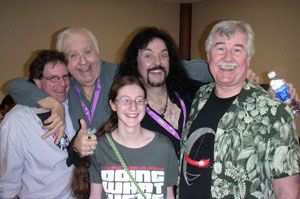
A great CD cover by Christopher Jones.
(Photo: Brian Price, Chuck McCann, Eleanor Price, Wally Wingert, Jerry Stearns)
16. Thwack That Dirigible
or
Do You Want Fries With That?
by Brian Price and Jerry Stearns
June 30, 2011: Convergence 2011
December 4, 2014
“I don’t drive anything I can’t crash and walk away from, if you know what I mean.”
“If we can fly it off the lot, we’ll take it.”
-- exchange at the Unified Steam Dirigible retrofit sales lot
Dirigible is probably one of our tightest overall productions. The live sound and voices meshed seamlessly with the recorded backgrounds and transitions. And we had a lot of good transitions jumping from live scenes to recorded bits (starring good ole Wally Wingert) and back again. Brian Westley’s live effects all sounded like part of the mix and didn’t jump out at you; they just were--nice and smooth. I like nice and smooth. I don’t remember any big technical problems. Over the years Jerry and I had collected all our own microphones, mixing boards, cables and mic stands hooked up to a couple of Mac laptops. All we did was send a live feed from our live mix to the Main Stage guys with the huge speakers and all the light and sound party equipment in the back of the ballroom. A nice kind of rumpled guy named Don, who’d been around at every Con that’d I’d ever worked on, always took care of us. He just plugged us in. He also adjusted the pink noise. You can get some other geek to explain pink noise.
The story was set up on the Terry Pratchett model—create some goofy characters and send them unsuspectingly into a couple of themes that you want to mercilessly, and oh so lovingly, kick the crap out of--in this case steam punk and that cool 2010 Christopher Nolan movie, Inception. Both were very visual, which is great for radio.
So, we had steam punk, steam burritos, and steam apple pie, and with a steam-powered wooden Dirigible which, of course, could travel in time, in space, and in dreams. Pretty cool for a half-hour parody.
Something that I’m really happy with is that we got the plot to come around. We got the complicated set up of the Count d’Orc (Gordon Smuder, Transylvania TV), his evil henchman, Oxford (Don Cosgrove), and the nefarious Apolline (Windy Bowlsby) wanting to trap the Princess (Megan Petersen) and her mellow assistant, Mallow (Eleanor Price) in deep dream-space just right. It worked better than this paragraph. We set ‘em up, got ‘em in, got ‘em out.
Meanwhile, we also ended up with one of the best straight-up parodies we’ve ever done by completely mutilating the entire concept of Antiques Roadshow with one short 3-minute skit, Pre-industrial Roadshow. A guy shows up with the Holy Grail to get appraised and suddenly Christian myth, Arthurian legend and Tolkien lore are in a shambles. I crack up every time I hear it, mainly because the performances are so good. Tim Wick and Gordon Smuder play it so cluelessly straight, it’s a sound to behold. If we have classic or two—this is one of them.
(I loved the scene transition where Gordon fell over a cliff in one dream, and landed on the ground in a different dream. That's better than Inception could do with visuals. -- Jerry)
I liked the idea of having auditions for the next dream at the end of show and I very much liked giving Tim the part of the head Scottish-accented dancer of the Hungarian Dwarf Parade. Tim usually gets stuck with all the “used dirigible salesman” parts, so it was nice to hear him stretch out and do one of the most over-the-top Scottish accents ever.
Not bad for live.
Available with ultra bombastic Led Zeppelin-like CD cover at Uncle Hugo's Science Fiction Bookstore. Cover art by Jerry Stearns and a computer.
17. SpaceGirl: Downloading the Legacy
by Brian Price and Jerry Stearns
July 5, 2012: Convergence 2012
December 5, 2014
The 15th Anniversary of the
Mark Time Radio Show: Big Big Big
The year 2012 was BIG, BIG, BIG for the Mark Time Radio Show, celebrating the 15th Anniversary of the Annual Mark Time and Ogle Awards for best Science Fiction and best Fantasy/Horror Audio from around the globe. We called in the BIG Kahunas for this one, and they answered the call. David Ossman, Mark Time himself, returned to our stage along with our old friends and compatriots, Phil Proctor, Melinda Peterson, Judith Walcutt and Richard Fish.
One name was missing—Firesign Theatre founder Peter Bergman had agreed to participate and then suddenly and tragically died of leukemia in the spring. We dedicate this show to Peter. There was no moment of silence for him that weekend in July, just many moments of laughter and fond remembrances for one of the 20th century’s funniest and most influential crazy guys. -- From the notes inside the SpaceGirl CD jewel case cover.
Sometimes it’s easiest just to quote oneself. It took some reflection and a few drafts to write those paragraphs above, but I think they said what they needed to say. Peter Bergman had had a huge influence on comedy and the pop culture of the United States for close to 50 years (he coined “Summer of Love” for heaven’s sake). He’d had a huge influence on everybody in the show, and I think for that reason, David and Phil especially felt the show must go on. Peter never missed a gig.
Convergence’s theme that year was “Wonder Women” (women is science fiction) and women guests of honor were exclusively invited, which included Judith Walcutt, who brought along her husband, David Ossman, and Tamora Pierce, who brought along her husband, Tim Liebe who happily volunteered for duty in the show. Best of all for us (and the show) Melinda Peterson joined us, and she brought along her husband, Phil Proctor.
We wrote the show around Melinda’s talents. She was our star. Besides having so much fun with them back in 1998 with Wizard Jack, I had recently worked with Melinda and Phil at the 2011 and 2012 National Audio Theatre Festivals directing Phil in TransMarsTango by Elaine Lee and writing the romantic comedy, September/September, that featured Melinda. Basically, we knew she could play any part we gave her. So, we gave her the silliest, heartfelt part we could come up with—SpaceGirl.
The script was even a little broader and more referential than usual since we were making fun of comic books and graphic novels. You can use that silly language of “Here I come to save the day” variety. Everybody knows where to go with characters and situations of heroes and cardboard villains like Dr. Creep.
The biggest thing I noticed directing a show with pros like Melinda, David and Phil is that all the different voices that they did from senators to school kids to newscasters to Piddles the dog (lovingly portrayed by Phil) were very distinct from each other. Every character, even if they only had two lines, sounded completely developed and clear. It’s amazing.
That attention to detail upped everybody’s game and Phil, Tim and Gordon’s portrayal of the Hungarian Dwarf Parade, explaining what the four “H”s in the Four H Club really mean to the Evidentiary Hearing of the Joint House and Senate Joint Sub-Committee on Extra-ordinary Super-heroic Occurrences, is one my favorite scenes ever. It’s total bedlam (in a good way).
Another thing Phil and David are amazingly fast and creative at is filling in the tiny spaces and voids in a script and a show with non-verbals and asides. They made sure something was always going on every second, every milli-second. Very Firesign.
What else? Tony Brewer came up from Bloomington, IN to help with live sound effects. He’s become the go-to Foley guy for David and Judith’s Agatha Christie Mystery projects. Watching Tony and Brian Westley up behind the SFX table on stage kind of reminded me of the two-drummer setup in the Allman Brother’s Band. Can’t argue with two drummers, or two Foley guys.
Eleanor wrote the SpaceGirl theme music, which was a tough assignment to make the piece sound superheroic and original at the same time. There’s a couple of cool minor chords in there somewhere, plus some very Hans Zimmer sounding percussion tracks. For the newscaster scenes we used a GarageBand preset, because only canned news music can sound like canned news music.
It was a fun show and it whipped along too quickly. The powers that be wanted the stage back for the Opening Ceremonies and there was no time for poetry. There should always be time for poetry, or maybe I just didn’t want the show to end.
Cover by Jerry Stearns and NASA.
18. The Sword in the Couch
by Brian Price and Jerry Stearns
July 4, 2013: Convergence 2013
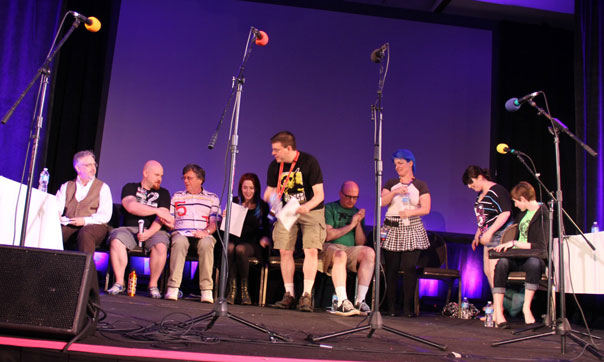
December 6. 2014
“Have we created a fairy ring yet?”
The Sword in the Couch was/is our shot at a pilot for a sit-com. I love situation comedies. They were the staple of old time radio and they continue to be the staple of TV. I’ve watched a lot of TV. I’m from the baby boom. We invented watching TV.
Car 54, Where Are You? The Dick Van Dyke Show, Gilligan’s Island (yes, Gilligan’s Island), MASH, Friends, Big Bang Theory. All these shows put 4,5, 6 maybe seven people in a couple of locations, give them a little tempest-in-a-teapot problem every week and you’ve got a comedy show.
So, our idea was to have a computer hacker and his girl friend hanging around a nice living room set up that looks a lot like a Mary Tyler Mooreish Summit Avenue, St. Paul Victorian house. They’ve got a couple of crazy neighbors and a landlord who constantly stops by to borrow sugar and unclog drains. The big difference for THE SWORD IN THE COUCH was we threw a fantasy element into it. The couch in the living room has a sword sticking out of it, and if the right person pulls the sword out of the couch they open up a portal to a world of princesses, leprechauns and other assorted fantasy types. Suddenly the characters could go places. The key to the sword turns out to be the girl friend, Wisteria (I love the name Wisteria).
We tried out the opening scene in January 2013 at Tim Wick’s Big Fun Radio Funtime! show and it worked very well with Tim Wick and Dawn Krosnowski (the voice of Convergence’s Connie—oh that voice) playing the leads, Sprocket and Wisteria. That scene really would have been enough for a pilot, about 15-20 minutes. But we figured for Convergence we needed to flesh out a complete beginning-to-end story. That’s when it got goofy and complex, adding a hippie (Kelvin Hatle), a pixie (Chase Peterson), two ladies in waiting (Windy Bowlsby—I love her NYC accent-- and Megan Petersen), a wizard (Don Cosgrove always makes a great wizard), a flute player (Eleanor Price, who was heading off to college for a music degree) and of course, George the Dwarf (Gordon Smuder).
We made fun of banks, fairy rings, soup and My Little Ponies. (And don't forget the King's speech to the armies before the final battle at the Black Gate. - J) Then we dove overboard and tried to create a musical battle between disco and Irish folk music live on stage. It was a lot to take on. It was very Pythonish. Jerry would’ve fixed it in the mix.
“There’s a wind coming out of the couch.”
Beautiful music, good acting, good writing, an original premise. What could go wrong?
Well, funny story about that. We didn’t have enough mic stands, so we borrowed a bag of beat-to-shit mic stands from the main stage. One was missing a setscrew. Big deal, a setscrew you say. What can a missing setscrew do? What the missing setscrew did was allow the pipe the microphone was clipped on to directly touch the floor. The missing setscrew screwed the recording. I could kill the mic stand. I could kill myself for shrugging and using a bad piece of equipment. What I’m trying to say is that we put on a really nice live show and we didn’t get a usable recording out of it, because there’s a BOOM BOOM BOOM sound recorded under the whole show from where the bad mic stand was bouncing on the stage floor. Every time an actor moved an inch the mic picked up the BOOM BOOM BOOM in the recording. Very disappointing. The moral being, never borrow or use untested equipment.
Unreleased, obviously. Look for a studio version sometime in the summer of 2015.
The other take home message -- “Fairyland, Canada, what’s the difference?”
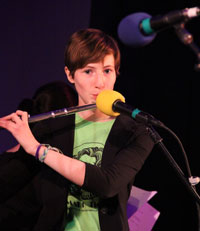
Photos by Peter Verrant. Photo at right is Eleanor Price, Floutist.
19: Cyber Bob and the Digital Nymph
by Brian Price and Jerry Stearns
July 3, 2014: Convergence 2014
December 7, 2014
“We’ve been wasting all our lives for this moment.”
Endings are hard. This was going to be the last live Mark Time Radio Show produced by Great Northern. We knew that. We’d planned for it. But we didn’t quite know how it was going to come out.
The plot would be a quest. What else could it be? It would be a search by Cyber Bob for his muse, for himself, for his place in the world, for a place to settle down. It would also be a seduction. We’d never really had a sexy voice to work with before…well, we’d always had Windy’s New York-accented Walmat greeter, “Hey is that a return in your pocket or are you just glad to see me?” voice, which is pretty darn sexy, but maybe in a different kind of way…but now we had Dawn Krosnowski. Dawn sounds like the digital goddess. She sounds cool and hot at the same time. She sounds like the J.M.W. Turner painting, The Golden Bough (which was the original cover for the James George Frazer book by the same title), that I found myself constantly referring to working on the script.
Along with David Ossman reprising Cyber Bob, we brought back a lot of different characters from our own mythology. Spider R. Access (he was Spider Webhead in the original Cyber Bob, but I couldn’t remember the exact name) played by Chase Peterson, Senator Mulder Hack from THE LEARNING CURVE played by Rich Fish (who had been around in the beginning so he had to be here), Chip Cupertino from DUPLICATING DULUTH played by Kelvin Hatle, who has the perfect CEO voice, and Katie Rumba from about three different plays played by Windy Bowlsby. Megan Petersen was back because she just belongs. And Tim Wick, of course, played the dopey guy who gets run over by everything in the story—some things never change.
With the hard-boiled detective with a heart of gold conceit, we could give David some bent metaphors and poetic language to work with. Nice to get back to that. There’s nothing like the detective monologue/voiceover in American literature, radio or film. Nothing touches it for creating an immediate mood for the audience and for being able to say anything you want to say. I remember pulling out NEUROMANCER by William Gibson to get the right tone when we were first working on Cyber Bob and realizing that Gibson was just doing Dashiell Hammett. Gibson couldn’t help himself. None of us can. Detective talk is as American as apple pie. So, are computers—two for two.
A couple of tidbits: 1. I think the idea that there is an ancient world inside every computer is very cool. We’ve got to use that again. We hardly tapped it. 2. We made a lot of fun of the cult of success in the show. I was trolling around YouTube looking for a video of Bill Gates to get a feel for his voice and I found a whole weird series of cloyingly sugary interviews with success celebrities like Gates, Warren Buffett and Mark Zuckerberg. The questions were so oddly softball like “Did you know you’d be a billionaire when you were five?” or “How has success made you a better human being?” What? We had to take a satirical shot at that crap. 3. The Kerberos Authentication Dragon stuff came from me and my wife not remembering which “first pet’s name” we were talking about and me being locked out of my own phone for a week—ha ha, real funny.
We pulled off a cheat. We used a sight gag. When sound effects artist Tony Brewer read the scene in the script where the Goddess sends Chip Cupertino a blow-up doll for his “date with the Nymph”, Tony immediately said he’d get a real life-sized blow up doll and he blew it up on stage. It cracked the live audience up and it works in the recording. So sue us.
“I already put it up on my Facebook page. It’s got six likes.”
A Day at the Library
As we, in real life, constantly float between the digital and analog you end up with this skit. It’s a very Jerry idea—take new technology like 3-D printers and warp it ever so slightly and it just gets weirder and funnier. Tim, Dawn and Windy had already performed this piece for the Fearless Comedy’s 2013 Big Fun Radio Funtime! Christmas show and David added his own twist on the guy who butted in line. (Here’s that piece.)
(This idea – of people lining up to use the library's 3-D printer – came from notes in marker on the back of a small paper plate, which I'd written on one morning after a meeting of volunteers at the community radio station where I host Sound Affects: A Radio Playground. Somebody had said something, and my mind jumped to this funny scene, and so I had to write it down and not forget it. There are two other stupid ideas still on that paper plate which I haven't figured out how to use yet. One has to do with The National Patch Bay – a great phrase and an evocative image that has a joke hiding in it somewhere. I like looking back at the piles and files of little notepad sheets with ideas on them, and finding some that were the origins of scenes in these Mark Time Radio Shows. – Jerry.)
***
THE END
The Mark Time Radio Show had quite a run. I have to thank Jerry and Kris again and again and I’ll leave to Jerry to thank all the Con people and Geek Partnership Society people who should be thanked.
(Okay, Brian – I'll thank Tim Wick and Windy Bowlsby for being just the perfect people to make an outstanding repertory cast. And I'll thank Bahb and Skaht and Tony from the Convergence Main Stage crew who were always there to support whatever misunderstood ambition we brought to them. I'll thank all the Mark Time Award and Ogle Award winners who came to the conventions to accept an award, and got unwittingly sucked into our little whirlwind of audio activity. Many of them embraced it and actually hosted a Mark Time party room in 2013, adding a whole new level of fun. And I'll thank the 600 or so people who came to the Grand Ball Room at Convergence – probably just to get a good seat for the Opening Ceremonies after our show – every year and laughed and applauded. And special thanks to the 5 or 6 people who actually bought Mark Time Radio Show CDs when they were offered. – Jerry)
I’ll just leave you with this final memory of the final show: Less than an hour before the show was to go on there still was no real good last line to Cyber Bob and Digital Nymph. Nothing was wrapping it up quite right. David Ossman suggested that just he and I find a corner somewhere and run his Cyber Bob lines. He wanted to get them just right. Here was a Firesign guy, an actor and a writer I greatly admire, a guy who’d worked with everybody from Jason Robards to John Goodman, a guy who’d written lines like “we’re all bozos on this bus” that were then scribbled on the restroom walls of my junior high, a guy who introduced me to the ear jazz of Lord Buckley, just a good guy—and after all these years and all these performances, he still wanted to get the lines just right. So, we wandered back into the maze behind the Double Tree Hotel ballroom and finally found a table and a couple bent chairs around the corner from the freight elevator and went over every line of the script. When we got to the end I was reading the Digital Nymph’s lines and I just said, “You want to jump off the cliff?” and David said, “That’s it. You got it. That’s the last line. That’s what she says.” “You want to jump off the cliff?” That is the last line. It’s the last line of a good script and last line of a creative life. You should always want to jump off a cliff. It’s the only way to go.
Thanks David.
(At just the time when we were making this Last Mark Time Radio Show, a group in Canada called The DecoderRing Theatre began releasing six shows for their Summer Showcase. We had agreed to let them use six of the Mark Time scripts and recreate the shows in their own Old-Time-Radio style. They called it Mark Time Show Time. They have a big following, and lots of experience, and we hoped that our work would get "out there" a bit further. DecoderRing did a really fine job of making fresh versions of our scripts. What we noticed is that the writing holds up very well. They aren't dated or stale, and even with voices other that those they were written for the silliness still comes through. We still like ours better, but that's as it should be with your own children. Some others of ours have been done by community theater groups around the country – High Moon, Drummer's Dome, Peter Galaxy, Vince Washburn - New Age Detective, and others. We hope that this helps spread the words, both about Great Northern Audio and about how much fun audio theater can be. Thanks to all of you who listen. – Jerry.)


